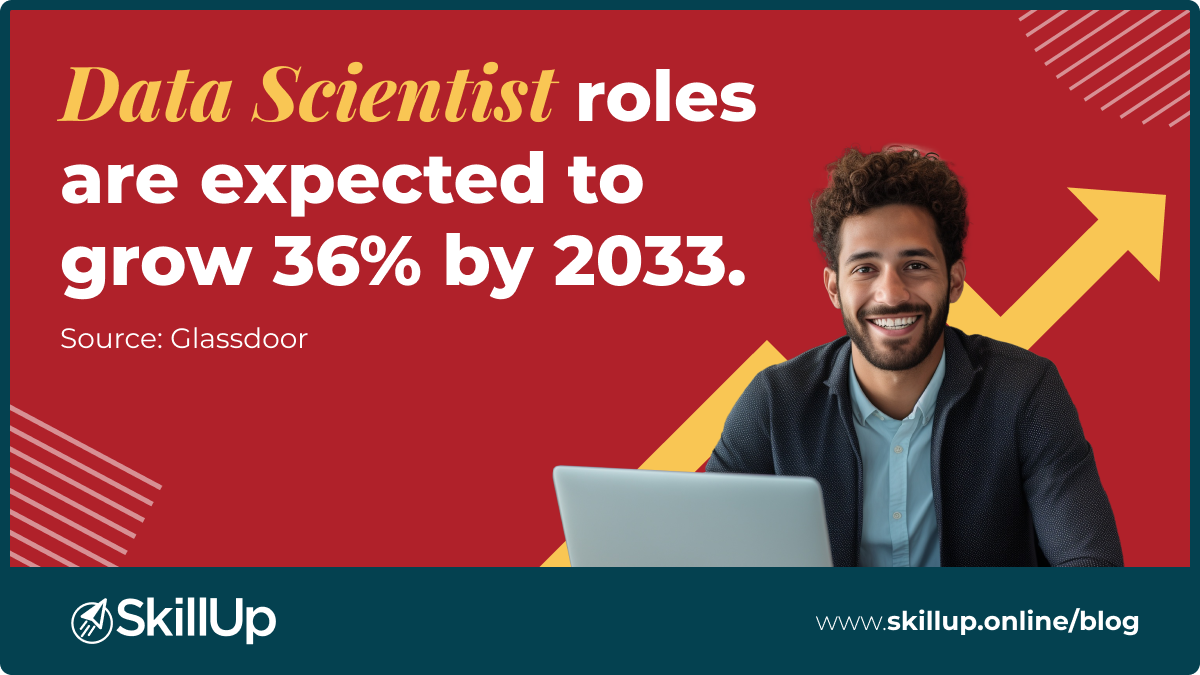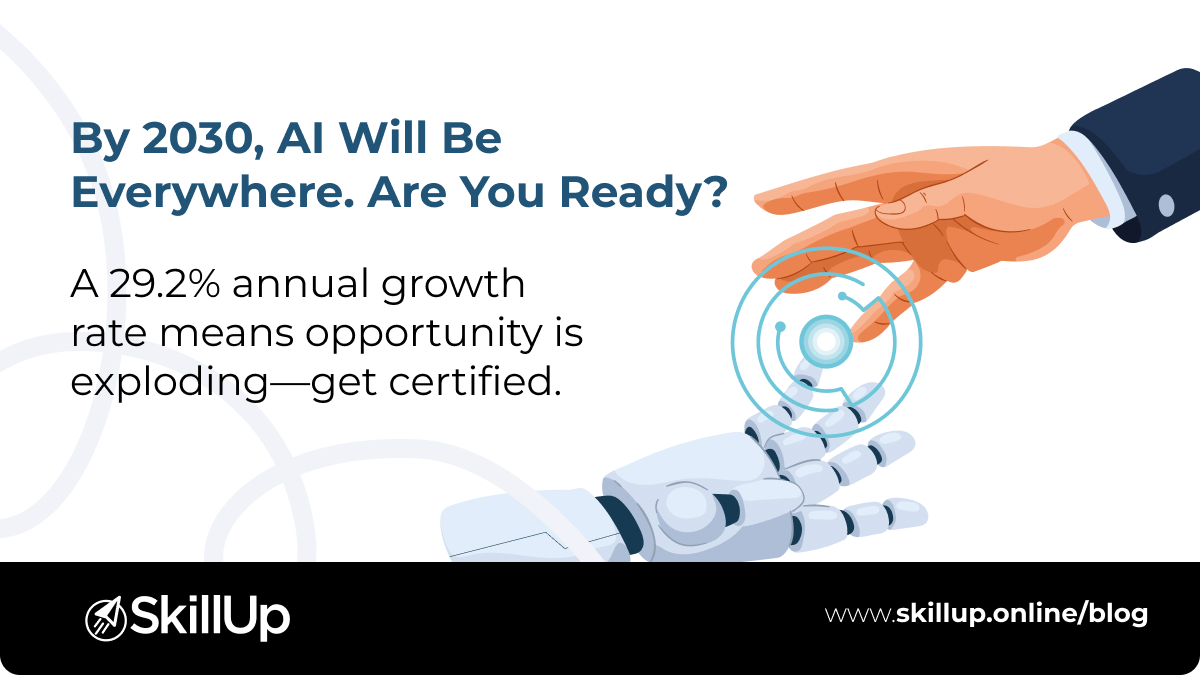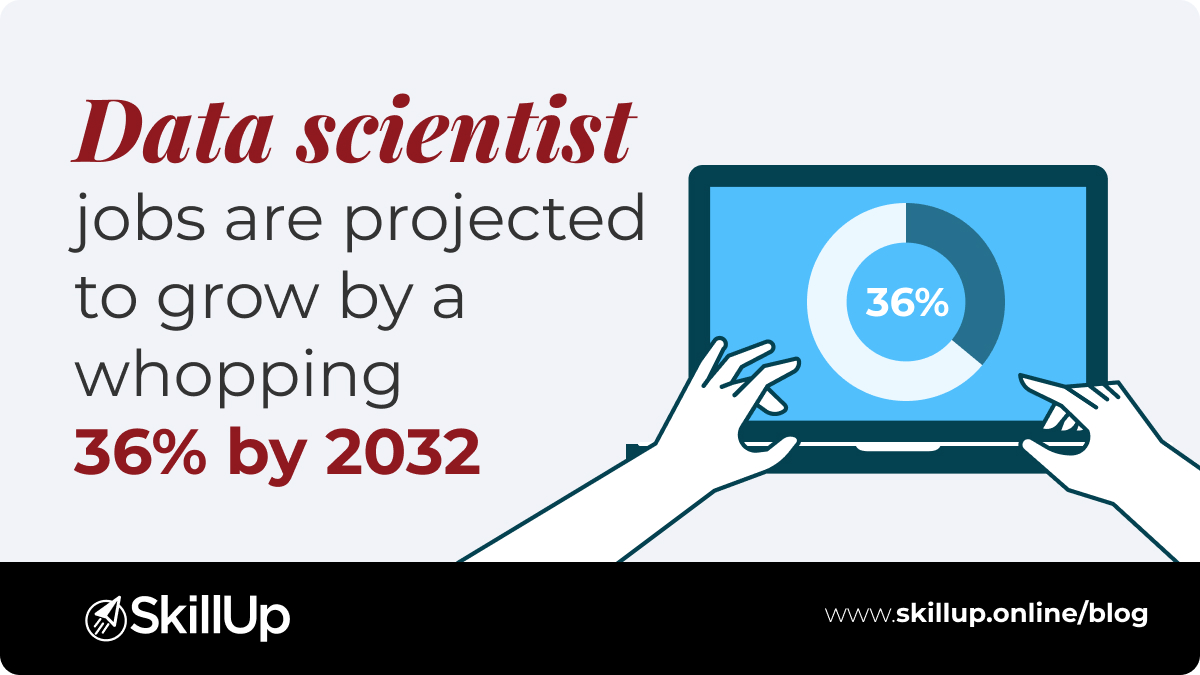The future is AI driven. Now, workers from a wide range of technical and non-technical backgrounds are exploring artificial intelligence as a practical career choice. For some, that means starting from scratch. For others, it means cross or upskilling their current resumé. Either way, breaking into artificial intelligence requires a good understanding of the subject’s fundamentals, practical experience, and commitment to a lifetime of continuous learning. But it’s worth it. Professionals who keep themselves on the cutting edge of this rapidly evolving and in-demand skill set are in high demand.
Employers Need Versatile Thinkers
One of the first questions learners entering the AI ecosystem ask is, “What do I need to land a top AI position?” The answer can be multi-faceted, depending on their current skill level and desired role. While technical skills, like fluency in programming languages such as Python and R, are a great starting point, many employers now want more. They’re looking for workers with hands-on skills and proof that they can turn ideas into working products. Plus, for those with aspirations of landing the top AI positions, employers are wanting the human skills to manage AI teams too.
So what is the industry looking for?
Business needs are three-fold. First, they require people with strong technical abilities. We’re talking machine learning, Python, R, cloud computing, neural network architecture, data visualization, and deep learning, to name but a few competencies. However, as a domain, AI is moving so fast that skills learned two years ago will be going out of date in the near future. That means employers are looking for people with strong underpinning knowledge and the ability to skill up quickly and continue to grow their skills.
Secondly, they’re looking for people with some practical experience who can hit the ground running. These people may not have detailed knowledge of a specific technology, but they will be able to show that they have the aptitude to build their understanding quickly and apply it to the underpinning knowledge they already have.
Thirdly, they’re looking for professionals who have personal strengths beyond just good technical know-how. They want critical thinkers, excellent communicators, and outstanding problem solvers. They’re seeking professionals who can lead, inspire, and manage teams. Plus, they need people who have vision and the desire to explore the fast-changing technical terrain.
Assessing Your AI Skills
So, how do you get started? Well, understanding where you currently are is useful and there are interesting online tests that measure the level of your AI skills. A good example is Workera. These tests enable you to learn about yourself so you can then explore opportunities that fit your present skills. Tests such as these also enable you to work out which new skills you should work on.
However, if you’re keen to get your hands dirty – and that is a good idea – the tech community is extremely active and there are some constructive ways to suss out where you sit in the scheme of things.
Hackathons: Hackathons offer keen professionals a variety of benefits. Not only do they drive you to work on a specific project, but they connect you with more experienced individuals who can mentor you and help you learn. Of course, they also present you with an opportunity to grow your resumé/portfolio, but the great thing is you don’t need to limit your hackathon search to just AI-focused events. Instead, you can consider more traditional software hackathons and work out how you can add an AI twist to your idea.
Coding Challenges: Coding challenges, like hackathons, encourage you to implement a practical application of what you’ve learnt, which is invaluable when applying for AI jobs. Furthermore, these competitions are usually enjoyable, and the extra sense of competitiveness can be a powerful motivator. To find out what’s currently going on, have a look at sites like Kaggle, HackerRank, CodinGame, and Halite.io.
Best Technical Resources to Establish Your AI Career
Once you’ve established where your skill levels sit, you’ll know what you need to work on and what you need to upgrade.
If you’re just starting out, then you should get to grips with the fundamentals. AI foundation courses can offer a great way to kick-start a career. Artificial Intelligence Foundations, for example, covers the fundamentals of Python, data visualization, Jupyter notebook, MongoDB , SQL and NoSQL and statistics. A nice mix of entry-level skills.
Alternatively, the chunkier IBM Applied AI Professional Certificate is an excellent career starter. Once you’ve got that under your belt, you can then consider whether you want to delve deeper into something like deep learning and neural networks or pursue a different branch of AI.
Note, though, specific platform proficiency is becoming more and more important now too. A good example is Microsoft’s Azure platform, which is popular for AI development and businesses are seeking out competencies through related Microsoft certifications.
However, if you’re not ready to sign up for courses yet, there are some great resources that allow you to do a deep dive into the subject matter on your own. Good examples include:
Learn with Google AI: Regardless of whether you’re just starting out or are a seasoned IT pro, this learning tool offers a good introduction to AI and machine learning. You’ll find exercises and information that can help you hone your skills.
MIT: AI and Deep Learning: This is also a valuable resource that talks about the day-to-day aspects of AI through the prism of self-driving cars. The course is ideal for dabblers deciding whether to commit to further studies in the domain or not.
Getting Your Foot in the Door with AI Leaders
To get the attention of a recruitment consultant, your resumé needs to be ticking the boxes. As already highlighted, this means being able to evidence you have the right technical skills through certifications, plus practical experience of building real products. If you have some platform specific proficiency e.g. Microsoft or AWS, all the better.
However, getting an interview is one thing, excelling at that interview is another. And it’s great human skills that will help you get your foot properly in the door with AI leaders.
Research carried out by Wonderlic has shown that 97% of employers believe soft skills affect job performance. That means now professionals with strong human skills are often favored in job applications and interviews.

What Soft Skills Are We Talking About Here?
The skills needed to think critically, lead, and manage a remote team may seem obvious, but they are nuanced. For example, winning the hearts and minds of senior management on a recommended change in direction requires a strong ability to tell a story with data. And to be able to analyze and problem solve is critical in today’s AI arena. These human skills can be listed in your resumé, however, things such as emotional intelligence are hard to get across on paper. Showing how you can think collaboratively and be a valuable member in a team can only come through when you’re talking to someone.
Career Paths in Artificial Intelligence
There are many paths you can pursue when you enter the AI domain. For example, you can go deeper into machine learning or deep learning, or you can specialize in data analytics instead.
Some career options include:
- Data Analytics: Where you find meaningful patterns looking at current and past data to help businesses make predictions. Median annual salary: $130,000.
- User Experience: Where you build business understanding of how people use apparatus so computer scientists can apply that understanding to produce more advanced software. Median annual salary: $80,000.
- Researcher: Where you can innovate and discover ways to advance AI and computer science research. Median annual salary: $85,000.
- AI Engineer/Machine Learning Engineer: Where you build AI models from scratch, utilizing data to create, build and maintain ML software apps. Median annual salary: $146,000.
- Big Data Architect: Where you create systems that enable businesses to collate and disseminate data. Median annual salary: $151,300.
A Final Word
Put simply, there’s a lot to take in if you’re starting a career in AI. However, there’s also a lot to look forward to. The creation of the internet was a paradigm shift just a few years ago. The development of AI is another one… and it’s already taking place. AI is impacting organizations across all industries, but those organizations are still in a state of innovation, discovery and uncertainty. Thus for those with a passion for the subject, and the determination to develop both their technical and human skills, the future is very bright.
Manager at SkillUp Online
Cybersecurity expert also training and mentoring on Datascience and Artificial Intelligence.
Artificial Intelligence
Data Science
Cyber Security – Major
Database – SQL






